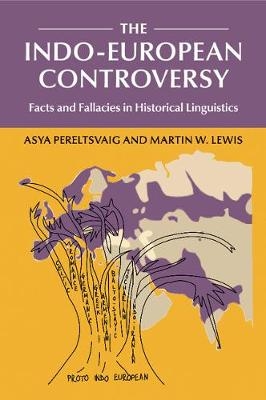
The Indo-European Controversy
Cambridge University Press (Verlag)
978-1-107-66538-5 (ISBN)
Over the past decade, a group of prolific and innovative evolutionary biologists has sought to reinvent historical linguistics through the use of phylogenetic and phylogeographical analysis, treating cognates like genes and conceptualizing the spread of languages in terms of the diffusion of viruses. Using these techniques, researchers claim to have located the origin of the Indo-European language family in Neolithic Anatolia, challenging the near-consensus view that it emerged in the grasslands north of the Black Sea thousands of years later. But despite its widespread celebration in the global media, this new approach fails to withstand scrutiny. As languages do not evolve like biological species and do not spread like viruses, the model produces incoherent results, contradicted by the empirical record at every turn. This book asserts that the origin and spread of languages must be examined primarily through the time-tested techniques of linguistic analysis, rather than those of evolutionary biology.
Asya Pereltsvaig is a lecturer in the Department of Linguistics at Stanford University, California, where she teaches courses in syntax, general and historical linguistics, and languages of the world. Her main area of specialization is the syntax of Indo-European, Semitic, and Turkic languages. She is the author of Copular Sentences in Russian: A Theory of Intra-Clausal Relations (2007) and Languages of the World: An Introduction (2012). Martin W. Lewis is a senior lecturer in the Department of History at Stanford University, California, where he teaches global historical and regional geography, contemporary geopolitics, and the history of Southeast Asia. His recent research focuses on the history of geographical ideas, especially those pertaining to the division of the world. He is the author of Wagering the Land: Ritual, Capital, and Environmental Degradation in the Cordillera of Northern Luzon, 1900–1986 (1992) and of Green Delusions: An Environmentalist Critique of Radical Environmentalism (1992), and co-author of The Myth of Continents: A Critique of Metageography (1997) with Kären Wigen and of Diversity amid Globalization: World Regions, Environment, Development (2012) with Lester Rowntree, Marie Price and William Wyckoff. He is also a co-editor of The Flight from Science and Reason (1997) with Paul R. Gross and Norman Levitt.
Introduction: the Indo-European debate and why it matters; Part I. The Vexatious History of Indo-European Studies: 1. Ideology and interpretation from the 1700s to the 1970s; 2. Anatolia vs the Steppes; Part II. The Failings of the Bayesian Phylogenetic Research Program: 3. What theory we want and what theory we get; 4. Linguistic fallacies of the Bayesian phylogenetic model; 5. Dating problems of the Bayesian phylogenetic model; 6. The historical-geographical failure of the Bayesian phylogenetic model; 7. Unwarranted assumptions; Part III. Searching for Indo-European Origins: 8. Why linguists don't do dates? Or do they?; 9. Triangulating the Indo-European homeland; 10. The non-mystery of Indo-European expansion; 11. Whither historical linguistics?; Conclusion: what is at stake in the Indo-European debate.
| Erscheinungsdatum | 04.12.2017 |
|---|---|
| Zusatzinfo | 9 Tables, black and white; 38 Maps; 6 Line drawings, black and white |
| Verlagsort | Cambridge |
| Sprache | englisch |
| Maße | 153 x 230 mm |
| Gewicht | 520 g |
| Themenwelt | Geisteswissenschaften ► Archäologie |
| Geisteswissenschaften ► Sprach- / Literaturwissenschaft ► Sprachwissenschaft | |
| Naturwissenschaften ► Biologie ► Evolution | |
| ISBN-10 | 1-107-66538-8 / 1107665388 |
| ISBN-13 | 978-1-107-66538-5 / 9781107665385 |
| Zustand | Neuware |
| Haben Sie eine Frage zum Produkt? |
aus dem Bereich


